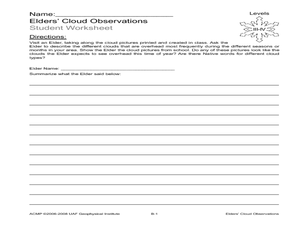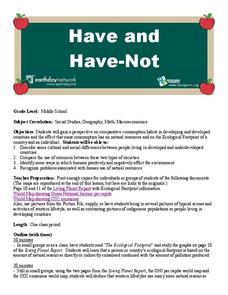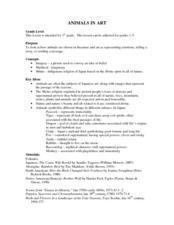Curated OER
Elder's Cloud Observations
Students study cloud types and Native language terms for clouds and cloud types. In this cloud types lesson, students listen to a Native American speaker discuss clouds and the words used to describe clouds. Students complete a worksheet...
Curated OER
Coastal Development
Students examine how a coastal area changes after it has been developed. They discover the impact of development on the environment. They illustrate their own non-developed area and change it into a developed area.
Curated OER
"For The Birds" [part II]
Students examine how Chinese and Japanese artists used different kinds of birds
as representations of ideas that were important in both cultures and create their own birds using the technique of origami.
Curated OER
Valley of the Butterflies
First graders explore why butterfly populations in Idaho's Lapwai Valley have decreased.
Curated OER
The Future of the Arctic National Wildlife Refuge
Students research the governments role is preserving the Arctic National Wildlife Refuge. They discuss the proponents and the opponents side of the issue.
Curated OER
The Philippines-U.S. Involvement
Young scholars research and discuss the rational for U.S. involvement in the Philippines. They discuss overall foreign and domestic policies of the U.S. Then they create a timeline that highlights this impact.
Curated OER
Environment: The Haves and the Have Nots
Students examine consumption habits in developed and developing countries and determine their effects on natural resources. In groups, they assess graphs on the Living Planet Report and observe the connection between consumption and...
Curated OER
Desert Xeriscaping
Seventh graders identify native species of desert vegetation, plan a xeriscape landscape, and recognize the importance of water conservation.
Curated OER
What is Southeast Asia?
Learners participate in various classroom activities designed to teach them about the location and cultures of countries in Southeast Asia.
Curated OER
Desert Xeriscaping
Middle schoolers recognize native species of desert vegetation while examining the need for water conservation. They design and create a xeriscape landscape using a variety of materials.
Curated OER
Flora, Fauna, and the Passing Seasons
Students discover representations in art, religion and cultural practices of the flora and fauna of specific geographical regions in this early elementary lesson plan. The instructional activity ends with a mural project by the entire...
Curated OER
Animals in Art
Students look at how animals are shown in literature and art as representing emotions, telling a story, or sending a message in this elementary school Language Arts and Visual Arts lesson.
Curated OER
Nature and Haiku Poetry
Students compose haiku poems and recognize how cultures value nature and
natural forces through the study of Japanese poetry. This lesson includes a bibliography of resources.
Curated OER
An Encounter of Former Foes
Students examine a timeline on the internet showing the relationship between the American Government and the Nez Perce in the 19th Century. After looking at the timeline and included map, students answer questions.
Curated OER
The Lewis and Clark Expedition
Middle schoolers discuss their prior knowledge of the Lewis and Clark expedition. Using the internet, they research the personal, political and economic influences that made an impact on the expedition. They also discover how the...
Curated OER
Caloric Expenditure in Powwow Dancing
Sixth graders investigate the meaning of different types of Native American music and dance. They determine how this music and dance has contributed to modern music and dance. They problem solve to determine the average length of the...
Curated OER
Shape Walk
Students take a field trip to a local park or beach to collect objects. They practice counting the objects and put them into categories according to type of shape like a cone, cylinder, etc... As an extension to the lesson students could...
Curated OER
Making Kites
Students engage in the study of kites and focus upon the evaluation and designs invovled. They conduct research into the different types of designs and use the information in order to create unique project designs. The drawings are...
Other
Indigenous Peoples [Pdf]
On September 13, 2007, the United Nations General Assembly adopted the Declaration on the Rights of Indigenous Peoples. Canada was one of only four countries that voted against it. The draft of the declaration can be downloaded here.
United Nations
United Nations: Cyber School Bus: Indigenous Peoples
This resource was designed to allow students to explore issues faced by indigenous peoples around the globe. In addition to providing a basic understanding of who indigenous people are, it also provides activities and resources for...
United Nations
United Nations Cyberschoolbus: Indigenous Peoples
Students can explore the cultures of various indigenous peoples around the world, e.g., the Maya of Guatemala, Amazon tribes, the Maori, the Navajo, and the Saami in Norway and Sweden. They will examine what it means to be indigenous and...
Smithsonian Institution
National Museum of the American Indian: Indigenous Geography
Indigenous Geography helps you develop key understandings on nine different dimensions as they relate to six Native communities located in the Western Hemisphere. Learn about the creation stories, place boundaries and landmarks, calendar...
A&E Television
History.com: What Is Indigenous Peoples' Day?
Since 1991, dozens of cities, several universities, and a growing number of states have adopted Indigenous Peoples' Day, a holiday that celebrates the history and contributions of Native Americans. Not by coincidence, the occasion...
University of Groningen
American History: Essays: Jefferson's Attitude Toward the Indigenous Peoples
Essay on the attitude Thomas Jefferson held about the Native Americans. Includes quotes from Jefferson's writings describing his thoughts on enslavement and treatment of indigenous peoples of the Americas.




!["For The Birds" [part II] Lesson Plan "For The Birds" [part II] Lesson Plan](http://content.lessonplanet.com/resources/thumbnails/122476/large/cgrmlwnvbnzlcnqymdeymtaxny0yoda5lwu0ew85zi5qcgc.jpg?1414222640)















![Indigenous Peoples [Pdf] Handout Indigenous Peoples [Pdf] Handout](https://d15y2dacu3jp90.cloudfront.net/images/attachment_defaults/resource/large/FPO-knovation.png)
